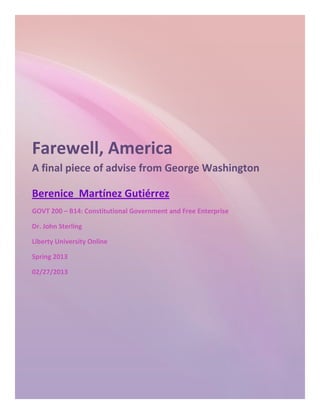
Farewell america
- 1. 201320 Spring 2013 GOVT 200-B14 LUO 1 Farewell, America Farewell, America A final piece of advise from George Washington Berenice Martínez Gutiérrez GOVT 200 – B14: Constitutional Government and Free Enterprise Dr. John Sterling Liberty University Online Spring 2013 02/27/2013 3/8/13 Berenice Martínez Gutiérrez LUO
- 2. 201320 Spring 2013 GOVT 200-B14 LUO 2 Farewell, America Farewell, America A final Piece of Advise from George Washington “Good bye!” “So long!” and “see you later!” are commonly used ways to bid farewell, however, any of these phrases would have left many things unsaid had they solely been used by George Washington as he retired from the United States’ presidency in 1796. Aswell-known, George Washington was the first U.S. president and served two terms, which lasted from 1789 to 1797. Although his efforts and accomplishments towards gearing up and strengthening the nation are undeniable, there was still much to be done before gaining stability as a republic when Washington retired. George Washington’s memorable farewell address advised Americans about political parties, foreign involvement, and the important role of religion in government to prepare the nation for the challenging years to come. President Washington first urged the states to uphold their unity as strongly as possible. Although this advice may seem obsolete in modern days, it was based on the fact thatU.S. citizensexhibited allegiance more so to their state of residence than to the core of the country. He also perceived political parties to be one of the greatest threats to the union of America; in fact, all parties are a bad idea. Theyare infested with ambitious men who will cross the line to win over the admiration and support from the people. This can be a great danger to the country as ambition becomes the ruler, while reason, logic, and the well-being of the nation are no longer the focus points. This can potentially have very detrimental effects in the nation (especially in with regional parties), as it can cause a division based on political 3/8/13 Berenice Martínez Gutiérrez LUO
- 3. 201320 Spring 2013 GOVT 200-B14 LUO 3 Farewell, America affiliation. For this, Washington emphasized a strong central government: the people should feel as Americans first, and as citizens of their state of residence second. Aside from state and political differences, he foresaw that the country might attempt to dividegeographically, and from ruralto industrialized. He urged America to collaborate as a whole and not be hesitant to provide to the other regions what they might lack. In short, George Washingtonemphasized the benefits of staying united as a nation, and encouraged the people to help each other, while avoiding party formation and affiliation at all costs. Now that the U.S. was an independent country, America must remain neutral of any international political conflict. Washington strongly emphasized this point; he knew the nation was not strong enough to get politically, socially, or economically involved with any of these other nations, and saw great dangers in pursuing any kind of relationship with them. He insisted on the avoidance of any type of permanent rivalry, as this will lead the nation’s leaders to make irrational decisions, possibly out of spite. There are also the more obvious reasons, such ashaving to go to war with an enemy, which could be fatal for a young and fragile nation as the United States was. Additionally, he warned us against forming any permanent alliances, and with very good reason. He wanted the nation to avoid conflicts of covetousness, disloyalties, and also to refrain from being disadvantaged in having to favor a nation at our own expense. There were many conflicts going on in Europe, and the best thing to do for America, as a young emerging nation, is to stay clear of conflict and to support neither side in an attempt not to create unnecessary or allies. Of course, it is imperative that we uphold the promises we have made to other 3/8/13 Berenice Martínez Gutiérrez LUO
- 4. 201320 Spring 2013 GOVT 200-B14 LUO 4 Farewell, America nations, but we must avoid making any new binds. Instead of meddling with international affairs, the U.S. should focus on striving to be self-sufficient and require as little as possible from overseas. Maintaining distance and peace among nations can only be beneficial. Possibly the most important piece of political wisdom that we can gain from this document is George Washington’s perception of religion and its role in government. He inspires us with the quote: “Of all the dispositions and habits which lead to political prosperity, religion and morality are indispensable supports.” Washington emphasized that our leaders must have a religious base. He realized the importance that the freedom to choose a religion is, therefore he did not enforce a specific religion. He did, however, considered it imperative that the leaders of the nation must be ruling not only with knowledge and experience, but also with Divine grace and inspiration. Morality and religion are correlated and dependent of each other. One cannot be moral without a religious background to hold as truth, because then morality becomes relative. Political leaders, though they must remain true to religious liberties granted by the nation, must use their religion as a base through which to filter every instance of governing the nation. They must make and interpret laws based on God-given guidelines, and enforce them with kindness and utmost respect. George Washington felt religion and morality were key ingredients to a successful national leadership. George Washington’s farewell address was more than just a resignation speech. It is a timeless reference for leaders of any kind, who may find guidance and become enlightened by the otherwise unclear truths expressed therein. 3/8/13 Berenice Martínez Gutiérrez LUO